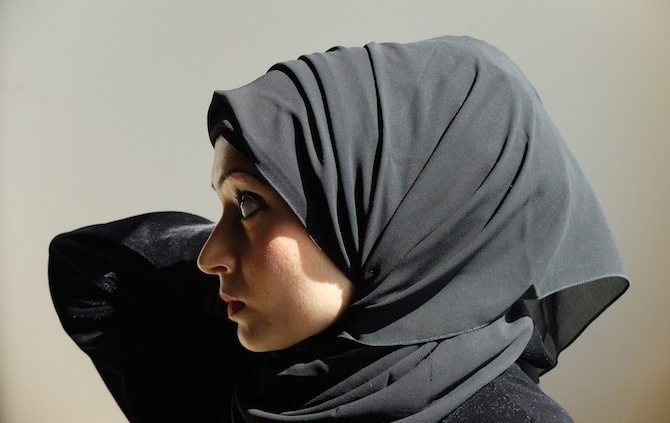Can I Remove My Hijab In Front of a Blind Man?
Hanafi Fiqh
Answered by Shaykh Yusuf Weltch
Question
Is it permissible for a woman to uncover in front of a blind person who is not related to her?
Answer
In the Name of Allah, the Most Merciful and Compassionate
It is permissible for a woman to uncover in front of a non-relative who is blind. This is because of the blind person’s inability to look at her if she were to uncover.
This is understood from the following Prophetic narration:
Fatima bint Qays (Allah be pleased with her) narrates that Abu ‘Amr divorced her (3 times) while he was away, so he sent a messenger to inform her. She became angry at him and said, “I swear by Allah, you’re not getting anything from me.” So she came to the Messenger of Allah (may Allah bless him and give him peace) and mentioned it to him. So he said, “You no longer get expenditure (from him).” He then ordered her to fulfill her post-divorce waiting period in the home of Umm Sharik then said, “She (Umm Sharik) has a lot of visitors (i.e., males) – perform you waiting period in the house of Ibn Umm Maktum, for indeed he is a blind man, you can take down your clothing (i.e., headscarf)….”
Looking at the Opposite Gender
Just as it is impermissible to expose certain parts of one’s body to non-relatives from the opposite gender, it is also impermissible to look at such parts from those people. This applies both for men looking at women and women looking at men. For this reason, the following Prophetic narration indicates:
The Messenger of Allah (may Allah bless him and give him peace) commanded Umm Salama and Umm Habiba to cover themselves before Ibn Umm Maktum (the blind man referred to in the previous narration), and they said, “He’s blind. He can’t see us.” He then replied, “Are you two blind? Can’t you see him?” [Tirmidhi]
In this narration, the Prophet’s (may Allah bless him and give him peace) command was for the women to lower their gaze from looking at the man. This is not proof against the above ruling: a woman can uncover in front of a blind man.”
Hope this helps
Allah knows best
[Shaykh] Yusuf Weltch
Checked and Approved by Shaykh Faraz Rabbani
3270 – عن فاطمة بنت قيس رضي الله عنها: أن أبا عمرو بن حفص طلقها البتة. وهو غائب. فأرسل إليها وكيله بشعير. فسخطته. فقال: والله ما لك علينا من شيء. فجاءت رسول الله صلى الله عليه وسلم فذكرت ذلك له. فقال “ليس لك عليه نفقة”. فأمرها أنت تعتد في بيت أم شريك. ثم قال “تلك امرأة يغشاها أصحابي. اعتدي عند ابن أم مكتوم. فإنه رجل أعمى. تضعين ثيابك. فإذا حللت فآذنيني” قالت: فلما حللت ذكرت له أن معاوية بن أبي سفيان وأبا جهم خطباني. فقال رسول الله صلى الله عليه وسلم “أما أبو جهم فلا يضع عصاه عن عاتقه. وأما معاوية فصعلوك لا مال له. انكحي أسامة بن زيد” فكرهته. ثم قال “انكحي أسامة” فنكحته. فجعل الله فيه خيرًا، واغتبطت.
——–
ص107 – كتاب فتح المنعم شرح صحيح مسلم – باب المطلقة البائن في عدتها سكنها ونفقتها وخروجها
6 – ومن أمره لها بالاعتداد عند ابن أم مكتوم أخذ بعض الناس جواز نظر المرأة إلى الأجنبي، بخلاف نظره إليها. قال النووي: وهذا قول ضعيف، بل الصحيح الذي عليه جمهور العلماء وأكثر الصحابة أنه يحرم على المرأة النظر إلى الأجنبي، كما يحرم عليه النظر إليها، لقوله تعالى {قل للمؤمنين يغضوا من أبصارهم …. وقل للمؤمنات يغضضن من أبصارهن} [النور: 30، 31] لأن الفتنة مشتركة، وكما يخاف الافتتان بها تخاف الافتتان به، ويدل عليه من السنة حديث نبهان مولى أم سلمة عن أم سلمة أنها كانت هي وميمونة عند النبي صلى الله عليه وسلم فدخل ابن أم مكتوم، فقال النبي صلى الله عليه وسلم: احتجبا منه. فقالتا: إنه أعمى، لا يبصر؟ فقال النبي صلى الله عليه وسلم: “أفعمياوان أنتما؟ ألستما تبصرانه؟ ” وهذا الحديث حسن. رواه أبو داود والترمذي وغيرهما، وقال الترمذي: هو حديث حسن، ولا يلتفت إلى قدح من قدح فيه بغير حجة معتمدة.
——–
ص121 – كتاب فتح المنعم شرح صحيح مسلم – باب المطلقة البائن في عدتها سكنها ونفقتها وخروجها
Shaykh Yusuf Weltch is a teacher of Arabic, Islamic law, and spirituality. After accepting Islam in 2008, he completed four years at the Darul Uloom seminary in New York, where he studied Arabic and the traditional sciences. He then traveled to Tarim, Yemen, where he stayed for three years studying in Dar Al-Mustafa under some of the greatest scholars of our time, including Habib Umar Bin Hafiz, Habib Kadhim al-Saqqaf, and Shaykh Umar al-Khatib. In Tarim, Shaykh Yusuf completed the memorization of the Qur’an and studied beliefs, legal methodology, hadith methodology, Qur’anic exegesis, Islamic history, and several texts on spirituality. He joined the SeekersGuidance faculty in the summer of 2019.
